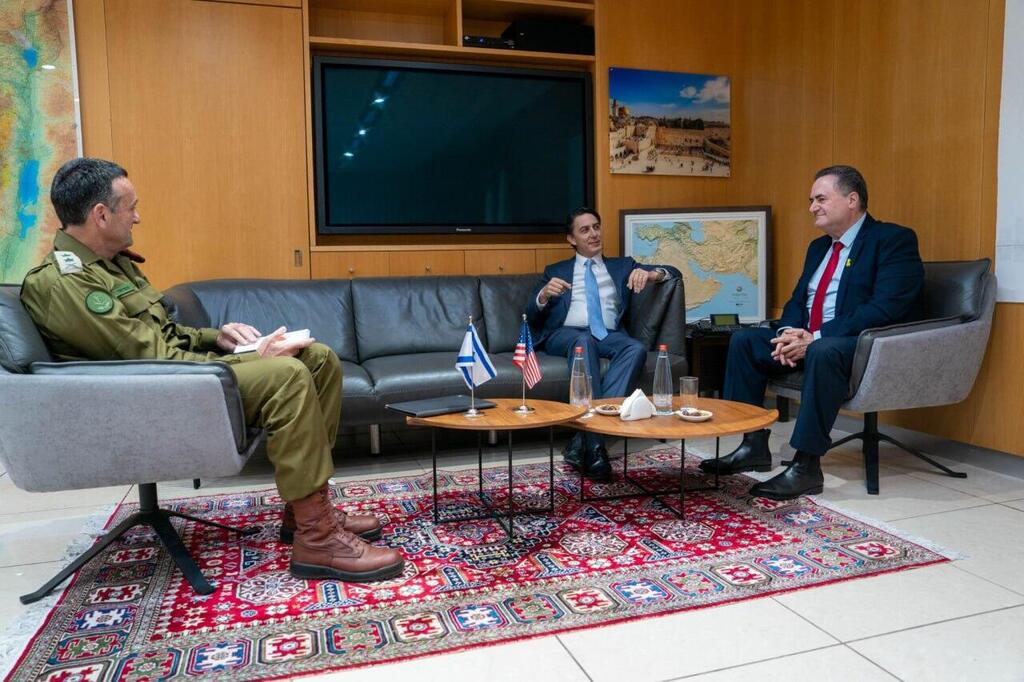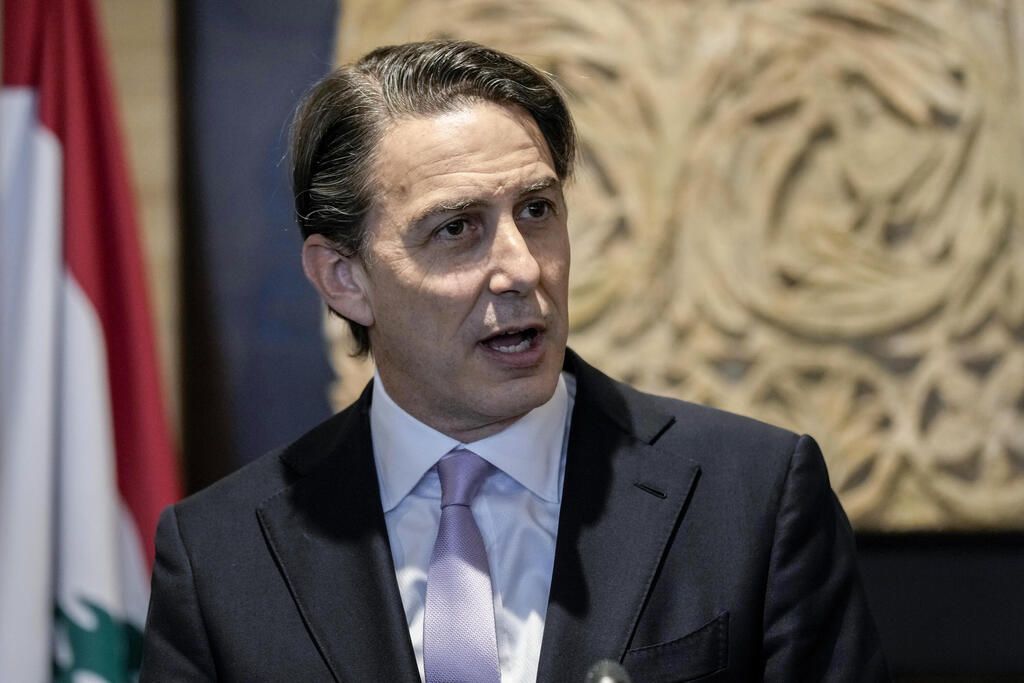The viral clip from last week, featuring President Biden's envoy Amos Hochstein, entering a Starbucks in Beirut where the staff refused his money, calling him their "guest," encapsulates his long-standing relationship with Lebanon. Born in Jerusalem, Hochstein's connection with the Arab nation helped secure the maritime border agreement between Israel and Lebanon two years ago, and now he seems poised to broker a deal with Hezbollah to restore calm to the north. Hochstein's successes, despite not being a traditional diplomat and coming from an energy background, highlight the personal nature of Middle Eastern politics. Once an Israeli and Jewish, Hochstein is also a trusted friend of Lebanon, proving this unique mix works.
Amos Hochstein meets Israel Katz
(Video: Defense Ministry)
A few weeks before October 7, Hochstein visited eastern Lebanon, making what seemed like a dramatic political statement. He toured the ancient ruins of Baalbek, an area known as a Hezbollah stronghold, dressed in white pants and a blue golf shirt, without a security entourage, taking photos of the crumbling stone walls and columns of what was once a Roman city. Several muscular men in black T-shirts followed him from a distance.
The Lebanese media was abuzz. How could a senior American official — an Israeli-born, no less — move so freely in a Hezbollah area? This scene demonstrated how the son of Susan and Micky Hochstein from Jerusalem became one of the few Americans trusted by Hezbollah's leadership, albeit without much enthusiasm. Even after most of the organization’s leadership was eliminated, it seems Nasrallah's successors still trust Hochstein, though not as much as Joe Biden does.
"He is a very close advisor to the president," Edward Gabriel, president of the American Task Force on Lebanon, a nonprofit organization in Washington focused on improving U.S.-Lebanon relations, told The New York Times. "As a result, he can speak with a lot of authority when he's on the ground."
2 View gallery


Defense Minister Israel Katz with Amos Hochstein and IDF Chief of Staff Herzi Halevi
(Photo: Defense Ministry)
Officially, Hochstein (51) is Biden's senior advisor for global energy and infrastructure, but that's just a title, as Biden has trusted him on various issues for many years. Hochstein joined the administration as a senior official in the State Department's energy division, helping manage oil and gas market disruptions after Russia invaded Ukraine. In early 2023, he was re-added to the White House team at Biden's request and was regularly in the Oval Office for various energy discussions before being appointed special envoy for Lebanon affairs.
Hochstein's first visit to Lebanon was in 1995. He said he fell in love with the country and was "drawn to its tragedy," even though gaining the Lebanese government's trust wasn't easy. In 2021, Lebanon announced it would regard Hochstein in his American capacity and not "in his Israeli status." Hochstein no longer holds Israeli citizenship, but a senior Democratic Party official previously said that "his Israeli background certainly played a role in his appointment as envoy for the crisis." According to him, "Biden learned during Obama's era that Israelis demand America make them feel like they're the most important child, otherwise they'll just turn their back on you." Either way, as can be seen from how Hochstein moves between Baalbek and Beirut, he has earned the trust of the country's key players.
In addition to his work on the Israel-Hezbollah file, Hochstein was also one of Biden's main envoys to Saudi Arabia. He was among the advisors who helped persuade the president that the U.S. should not ostracize Crown Prince Mohammed bin Salman, despite the revulsion over his role in the 2018 murder of Washington Post journalist Jamal Khashoggi. Hochstein and the Middle East envoy, Brett McGurk, led quiet diplomacy in pursuit of the "big deal" that was supposed to normalize relations between Israel and Saudi Arabia before October 7 disrupted everything.
From his start with Hillary Clinton to becoming a trusted advisor to Biden, Hochstein went from being a young Jerusalemite, a Bnei Akiva member who served in the armored corps, to a key player in U.S. foreign policy. His immediate family still resides in the Rehavia neighborhood of Jerusalem. After his military service, he moved to the U.S. and uniquely secured a senior staff position on the House Foreign Affairs Committee. By 1997, during the Bill Clinton administration, while still in his mid-20s, Hochstein was sent to North Korea to report on its economic and military status and was later involved in secret dealings with Iraq. He has since transitioned between diplomatic service and the private energy sector, maintaining extreme discretion at every turn. He is married to Julie Ray Ringel, a coach and faculty member at Georgetown University in Washington, and they have four children.
His initial connection with Biden began in 2007 when he was responsible for policy matters in Senator Chris Dodd's brief presidential campaign, who was very close to Biden. Hochstein's big break came while working for Hillary Clinton in the State Department during President Barack Obama's first term. He worked to help Ukraine find a new natural gas supply following Russia's 2014 invasion of Crimea, weaving a deep network of connections and understanding in the global energy arena.
Obama's second Secretary of State, John Kerry, appointed him in 2014 as the coordinator for international energy affairs, effectively making him America's chief energy diplomat. He worked closely with Vice President Joe Biden, who quickly grew fond of him. This proximity later made Hochstein the focus of attention from conservative media and Republican Congress members when reports surfaced that in 2015 he expressed concern to Biden about his son Hunter’s ties in Ukraine.
Get the Ynetnews app on your smartphone: Google Play: https://bit.ly/4eJ37pE | Apple App Store: https://bit.ly/3ZL7iNv
Regardless, Hochstein has always remained particularly loyal to Biden. After The New York Times published an editorial in June last year urging Biden to withdraw from the presidential race, Senator John Fetterman, the Pennsylvania Democrat, tweeted profanity against the article. Hochstein promptly retweeted it.
If Hochstein can now bring calm to Lebanon, he may return to the private sector in January with his head held high, as one of Biden's few foreign envoys who successfully completed their missions.





